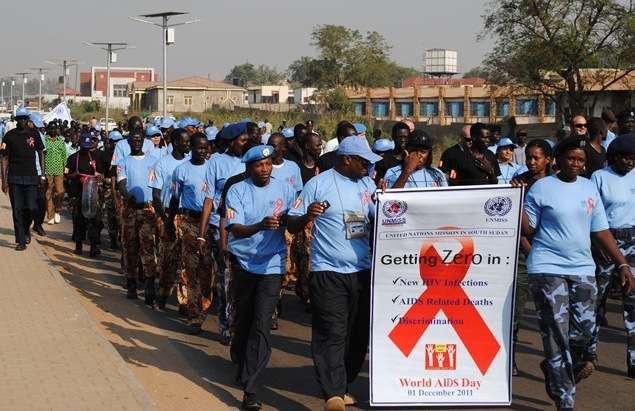HIV/Aids infection rate in South Sudan hits 2.9% in 2019
August 8, 2019 (WAU) – Infection rates of HIV/Aids in South Sudan now stands at 2.9% compared to last year’s 2.7%, a senior official from South Sudan HIV/Aids Commission disclosed on Thursday.

The deputy director for the HIV/Aids body, Dr Achol Ayom attributed upsurge in infection rates to the years of conflict, which forced people into the protection of civilian camps in parts of the country.
She said some young men also become victims of the deadly disease due to their involvement in commercial sex with sex workers.
“All over South Sudan, the percentage is 2.9 %. The number has increased and the reason is because of the conflict,” said Achol.
The official said trauma among people living in camps without loved ones had made people adopt partners minus knowing their statuses.
She said the challenging economic situation in the country has lured some of the young girls into prostitution for survival purposes.
According to the national director for HIV/Aids in the South Sudanese army (SSPDF), Yohana Mabor Deng, 12,500 out of the 250,000 uniformed soldiers are living with HIV/Aids across the country.
He attributed the rise in infection rates of HIV/Aids to ignorance among the force about the dangers of the deadly viral disease.
Meanwhile, the country director for the United Nations agency in charge of fighting HIV/AIDS (UNAIDS), Sofia Mukasa said the organization is working closely with the ministries of health, defence and HIV/Aids Commission to conduct voluntary testing and counselling services as part of efforts to control spread of the disease.
She said UN-AIDS has adopted circumcision as other alternative measures to prevent transmission of HIV from one person to another.
Mukasa said the stigma is still a major challenge among HIV/Aids victims.
Last year, UNAIDS and South Sudan officially launched a five-year strategic plan to halt new infections and deaths linked to the disease.
South Sudan’s AIDS Commission says of 2.9% infected with the disease, only about 25,000 people in the country are currently on treatment.
(ST)
